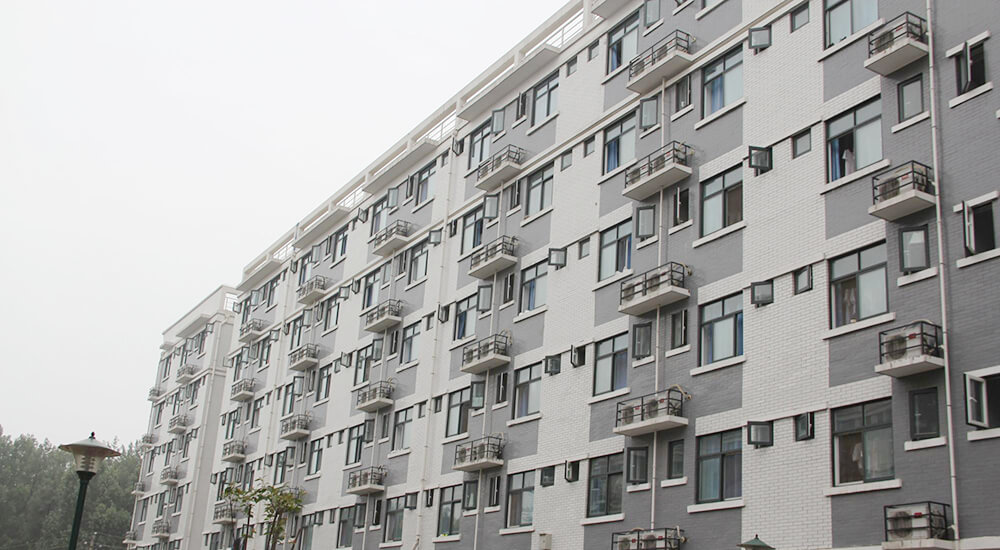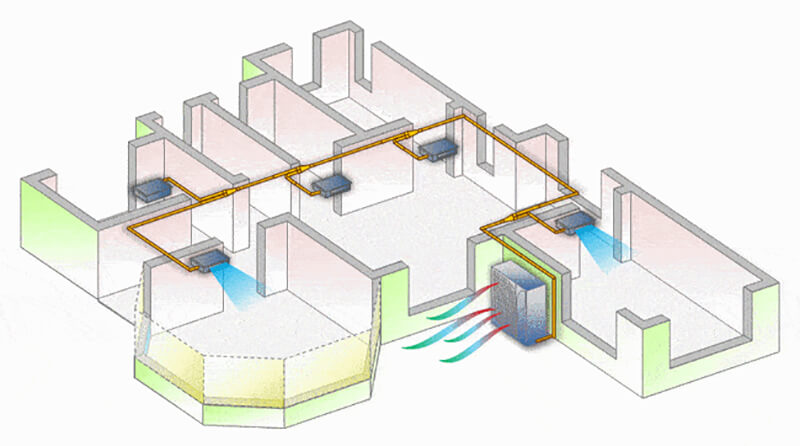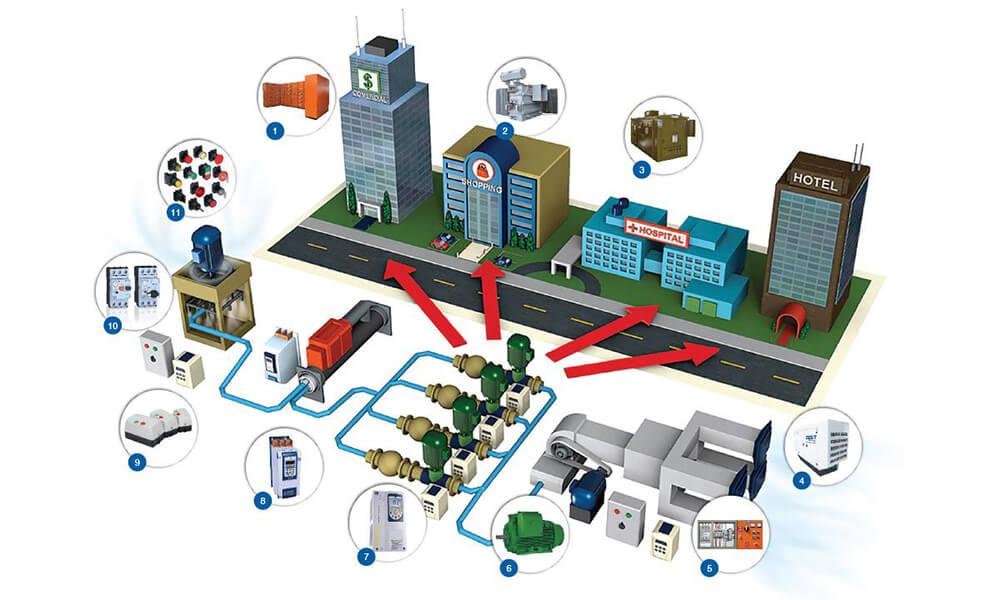High-rise condominium developments have become synonymous with modern urban living, offering breathtaking views and luxurious amenities. However, behind the glittering facades and towering structures lie unique challenges, especially when it comes to heating, ventilation, and air conditioning (HVAC) systems. The choice of an HVAC system for high-rise condos is a critical decision that can significantly impact the comfort, energy efficiency, and overall quality of life for residents.
HVAC systems in high-rise condo buildings help control heating, cooling, and air quality in these tall structures. They need to work hard to push air to all the floors, making sure everyone gets enough warm or cool air. These systems usually have big units on the roof or in the basement, with ducts that carry the air to different condos. It’s important to design these systems well so they don’t use too much energy and keep everyone comfortable. Regular checks and fixes are needed to keep everything running right. These HVAC systems are complicated but very important for making life in high-rise condos comfortable.
In this article, we will delve into the world of HVAC systems specifically tailored for high-rise condo developments. We will explore the distinctive challenges posed by these architectural marvels, examine the different HVAC options available, and provide valuable insights into the factors that developers, architects, and condo associations should consider when making this pivotal choice.

The Unique HVAC Challenges of High-Rise Condo Developments
1. Vertical Space Limitations
High-rise condos are architectural marvels, but their towering structures come with a unique set of challenges for HVAC systems. One of the foremost challenges is the limited vertical space available for HVAC equipment. Unlike sprawling suburban homes, high-rise condos require innovative solutions to fit essential HVAC components within confined mechanical rooms or designated spaces.
2. Energy Efficiency and Sustainability
The Importance of Energy Efficiency
Energy efficiency is paramount in high-rise condo HVAC systems. With residents residing nearby and a significant demand for cooling and heating, energy consumption can skyrocket. Developers must prioritize energy-efficient HVAC systems to reduce operational costs and environmental impact.
Sustainable Practices
High-rise condos are increasingly adopting sustainable HVAC practices. This includes integrating renewable energy sources, using environmentally friendly refrigerants, and incorporating green building standards. Sustainability not only benefits the environment but also attracts eco-conscious buyers and investors.
3. Noise Control and Comfort
The Challenge of Noise
Noise control is a persistent challenge in high-rise condos. HVAC systems, if not designed and installed with care, can generate excessive noise that disturbs residents. Reducing noise transmission between units and common areas is essential for creating a peaceful living environment.
Prioritizing Resident Comfort
Comfort is non-negotiable in high-rise condos. Residents expect consistent temperatures and controlled humidity levels. HVAC systems must be capable of delivering reliable and comfortable indoor conditions in all seasons.
4. Individual Unit Control and Zoning
Personalized Comfort
High-rise condo residents often have different comfort preferences. Offering individual control and zoning options allows occupants to tailor their indoor environments to their liking. Modern HVAC technologies enable customized comfort while optimizing energy use.
Zoning for Efficiency
Zoning is not just about comfort; it also enhances efficiency. It enables the HVAC system to concentrate heating or cooling in occupied areas, reducing energy waste in unoccupied spaces.
5. Maintenance Challenges
Access and Maintenance
High-rise condo HVAC systems can be challenging to maintain due to limited access to mechanical rooms or rooftop equipment. Routine maintenance must be carefully planned to ensure uninterrupted service.
The Role of Preventive Maintenance
Preventive maintenance is the key to prolonging the lifespan of HVAC equipment in high-rise condos. Regular inspections, filter replacements, and cleaning schedules are crucial to avoid breakdowns and costly repairs.
Types of HVAC Systems for High-Rise Condos
Let’s take a look at a video for reference.
When it comes to selecting HVAC systems for high-rise condos, various options are available, each with its own set of advantages and considerations. Let’s explore the most common types:
1. Central HVAC Systems
Overview
Central HVAC systems are a traditional choice for high-rise condos. They involve a centralized cooling and heating plant that serves the entire building. These systems are typically located in a dedicated mechanical room.
Advantages
- Efficient: Central systems are known for their energy efficiency, especially in larger buildings.
- Uniform Temperature: They ensure consistent temperatures throughout the condo units.
- Economies of Scale: Centralized maintenance can be more cost-effective.
Considerations
- Space Requirements: Central systems require substantial space for mechanical equipment.
- Maintenance Access: Access to the mechanical room must be carefully planned for maintenance purposes.
- Initial Costs: Installation costs can be higher compared to other systems.
2. VRF (Variable Refrigerant Flow) Systems
Overview
VRF systems, also known as VRV (Variable Refrigerant Volume) systems, offer flexibility and energy efficiency. They use refrigerant as the cooling and heating medium, eliminating the need for extensive ductwork.
Advantages
- Zoning Capability: VRF systems allow for individual unit control and zoning, optimizing energy use.
- Space-saving: They require less space compared to central systems.
- High Efficiency: VRF systems can achieve high levels of energy efficiency.
Considerations
- Installation Expertise: Proper installation and commissioning are crucial for optimal performance.
- Cost: While energy savings can be significant, initial costs may be higher than conventional systems.
3. Ductless Mini-Split Systems
Overview
Ductless mini-split systems are a versatile option for high-rise condos. They consist of individual units installed in each condo unit, connected to an outdoor condenser unit.
Advantages
- Individual Control: Residents can control the temperature in their units independently.
- Compact: Ductless systems are space-saving and do not require ductwork.
- Easy Installation: Installation is relatively straightforward.
Considerations
- Exterior Appearance: The outdoor condenser units should be aesthetically integrated into the building’s design.
- Maintenance: Regular cleaning and maintenance are essential for peak performance.
4. Geothermal Systems
Overview
Geothermal HVAC systems harness the stable temperature of the ground to provide heating and cooling. They are energy-efficient but require substantial upfront investment.
Advantages
- Sustainability: Geothermal systems are highly sustainable and environmentally friendly.
- Energy Savings: They can significantly reduce heating and cooling costs over time.
- Longevity: Geothermal systems have a long lifespan.
Considerations
- Installation Costs: The initial cost of drilling and installation can be high.
- Space Requirements: Geothermal systems require land or vertical boreholes for heat exchange.
Factors to Consider When Choosing an HVAC System
Selecting the ideal HVAC system for a high-rise condo development is a complex decision that requires careful evaluation of several critical factors. Here are the key considerations:
1. Building Design and Layout
Architectural Design
The architectural design of the building plays a significant role in HVAC system selection. Consider factors like the number of floors, window placements, and the orientation of units.
Space Allocation
Determine the available space for HVAC equipment. High-rise condos often have limited mechanical room space, necessitating compact system choices.
2. Energy Efficiency and Sustainability
Energy Consumption
Evaluate the expected energy consumption of the HVAC system. High-efficiency systems can significantly reduce ongoing operational costs.
Environmental Impact
Consider the environmental impact of your HVAC choice. Sustainable options can help achieve green building certifications and attract environmentally conscious buyers.
3. Noise Control and Comfort
Noise Considerations
Ensure that the HVAC system is designed and installed to minimize noise transmission between units. Quiet and comfortable living spaces are a priority.
Consistent Comfort
Residents expect consistent comfort throughout the year. Select a system that can maintain comfortable temperatures and humidity levels.
4. Individual Unit Control and Zoning
Resident Preferences
Recognize the diverse preferences of condo residents. Choose a system that allows individual unit control and zoning to cater to specific comfort needs.
Efficiency Through Zoning
Zoning not only enhances comfort but also improves energy efficiency by directing heating or cooling where it’s needed most.
5. Maintenance and Accessibility
Maintenance Requirements
Consider the maintenance needs of the HVAC system. Accessibility for maintenance personnel is crucial for routine servicing.
Preventive Maintenance
Implement a preventive maintenance plan to extend the life of the HVAC equipment and minimize unexpected breakdowns.
6. Initial Costs and Long-Term Savings
Initial Investment
Understand the upfront costs associated with the HVAC system. Compare the initial investment to long-term savings and benefits.
Return on Investment (ROI)
Calculate the potential return on investment (ROI) by factoring in energy savings, reduced maintenance costs, and any available incentives or rebates.
7. Compatibility with Building Systems
Integration
Ensure that the selected HVAC system can seamlessly integrate with other building systems, such as fire alarms and access control.
Future Expansion
Consider future expansion possibilities. The HVAC system should be scalable to accommodate additional units or floors if needed.
8. Local Climate and Weather Considerations
Climate Conditions
Take into account the local climate and weather patterns. The HVAC system should be capable of handling both extreme cold and hot conditions.
Humidity Control
In regions with high humidity, prioritize HVAC systems that can effectively control indoor humidity levels.

Energy Efficiency and Sustainability
Energy efficiency and sustainability are paramount considerations when selecting an HVAC system for high-rise condo developments:
The Importance of Energy Efficiency
Energy-efficient HVAC systems can significantly reduce operational costs and environmental impact. Consider systems with high Energy Efficiency Ratios (EER) and Seasonal Energy Efficiency Ratios (SEER).
Sustainable Practices
1. Integration of Renewable Energy
Explore options for integrating renewable energy sources, such as solar panels or wind turbines, to power HVAC systems partially or entirely.
2. Environmentally Friendly Refrigerants
Choose systems that use environmentally friendly refrigerants with lower Global Warming Potential (GWP) and Ozone Depletion Potential (ODP).
3. Green Building Standards
Adopt green building standards and certifications, such as LEED (Leadership in Energy and Environmental Design) or ENERGY STAR, to ensure sustainability goals are met.
Noise Control and Comfort
The Challenge of Noise
Noise control is crucial for high-rise condo HVAC systems. Excessive noise can disrupt residents’ peace and comfort. Prioritize quiet HVAC solutions.
Acoustical Design
Consider acoustical design elements and materials to minimize noise transmission between units and common areas.
Quieter HVAC Technologies
Explore quieter HVAC technologies, such as variable-speed compressors and sound-absorbing insulation, to enhance resident comfort.
Individual Unit Control and Zoning
Personalized Comfort
Provide residents with individual control over their indoor environments. Modern HVAC systems offer smart thermostats and zoning capabilities.
Zoning for Efficiency
Implement zoning strategies to optimize energy use by directing heating or cooling where it’s needed most.
Maintenance and Long-Term Performance
1. Access and Maintenance
Ensure that maintenance personnel have easy access to HVAC equipment for routine inspections and servicing.
2. Preventive Maintenance
Implement a preventive maintenance plan that includes regular filter replacements, cleaning schedules, and equipment inspections to extend the lifespan of HVAC systems.
3. Lifespan Considerations
Consider the expected lifespan of HVAC equipment when making a decision. High-quality systems with proper maintenance can last longer and offer better long-term value.
4. Cost Savings Through Maintenance
Emphasize to condo associations and property managers that proactive maintenance can lead to significant cost savings by reducing repair expenses and prolonging the need for replacements.

Conclusion
Selecting the right HVAC system for high-rise condo developments is a critical decision that impacts residents’ comfort, operational costs, and environmental sustainability. As you navigate this complex choice, keep the following key takeaways in mind:
1. Prioritize Energy Efficiency and Sustainability
Make energy efficiency and sustainability top priorities. High-rise condo HVAC systems should be designed to minimize energy consumption, reduce carbon footprints, and adhere to green building standards.
2. Embrace Noise Control and Resident Comfort
Invest in acoustical design and technologies that prioritize noise control. A quiet living environment contributes significantly to residents’ comfort and well-being.
3. Individual Control and Zoning
Offer residents the ability to control their indoor environments through zoning and individual thermostats. This not only enhances comfort but also optimizes energy use.
4. Commit to Regular Maintenance
Recognize the importance of preventive maintenance. Regular inspections, filter changes, and cleaning schedules are essential to ensure HVAC systems operate efficiently and have a longer lifespan.
5. Consider the Long-Term Benefits
Evaluate HVAC system choices not only based on initial costs but also on long-term savings and benefits. High-quality systems with energy-efficient features can offer excellent returns on investment.
6. Stay Compliant with Local Codes and Regulations
Ensure that the chosen HVAC system complies with local building codes and regulations. Engage with experienced HVAC contractors who understand the specific requirements of high-rise condo developments.
By carefully considering these factors and collaborating with HVAC experts, you can select the best HVAC system for your high-rise condo development. A well-chosen system contributes to the overall satisfaction of residents, reduces operational costs, and promotes a sustainable living environment.
Remember that every high-rise condo development is unique, so tailor your HVAC system choice to the specific needs and goals of your project.
If you want to know more, please click below:
- Grilles, Registers & Diffusers – The Ultimate Guide
- HVAC Linear Slot Diffusers – The Ultimate Guide
- HVAC Egg Crate Diffuser – The Ultimate Guide
- HVAC Jet Nozzle Diffuser – The Ultimate Guide
- HVAC Linear Bar Grilles – The Ultimate Guide
- HVAC Air Swirl Diffusers – The Ultimate Guide
- HVAC Round Ceiling Diffusers – The Ultimate Guide
- Round Ceiling Diffusers – The Ultimate Guide
- Exhaust Air Louver – The Ultimate Guide
- HVAC Registers – The Ultimate Guide


